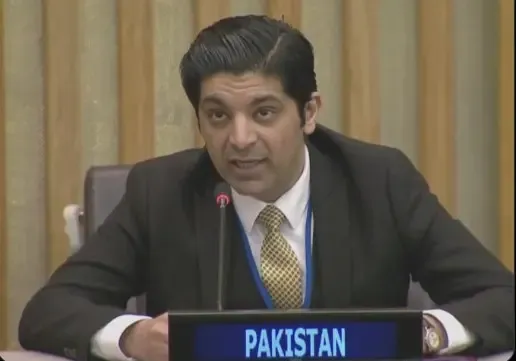Is Pakistan Renewing Its Justification for Terrorism at the UN?

Synopsis
Key Takeaways
- Pakistan's claims of freedom fighting are met with international skepticism.
- India emphasizes the gravity of terrorism as a violation of human rights.
- International law categorically condemns acts of terrorism.
- The debate on the definition of terrorism continues to hinder global agreements.
- Human rights must be prioritized in the fight against terrorism.
United Nations, Oct 23 (NationPress) Pakistan has made a renewed effort to justify its terrorism by defending its terrorist groups dispatched to launch attacks on India, absurdly asserting that they are freedom fighters.
India has condemned this as hypocrisy and doublespeak from the epicenter of global terrorism.
Muhammad Jawad Ajmal, a Counsellor at Pakistan's UN Mission, stated, nations should differentiate between terrorism and the legitimate right of people to resist foreign occupation. He falsely asserted that this distinction is well-recognized in International Law, International Humanitarian Law, and General Assembly resolution 46/51, which he claimed endorses this stance.
However, a 1994 General Assembly declaration clearly states, criminal acts that incite terror in the public or targeted groups for political purposes are unjustifiable, regardless of any invoked justifications.
This principle is reiterated in a 2004 Security Council resolution and the 1999 International Convention Against Financing Terrorism, adopted by the UN General Assembly.
The Assembly resolution Ajmal referenced, 46/51 from 1991, briefly mentions liberation struggles but does not legitimize terrorism under that pretext. It emphasizes that it unequivocally condemns all acts of terrorism, regardless of who commits them.
It urged all nations to fulfill their responsibilities under international law and abstain from engaging in terrorist acts in other states.
Raghoo Puri, a First Secretary at India's UN Mission, aimed to correct Pakistan's stance, asserting, terrorism is one of the most serious offenses that fundamentally undermines humanity's core values. It embodies the worst forms of bigotry, violence, intolerance, and fear, with terrorists representing the worst aspects of humankind.
He remarked, Pakistan's hypocrisy is now evident.
Puri highlighted that Pakistan is a notorious epicenter of terrorism, with established connections to numerous terror attacks worldwide targeting innocent civilians.
During an interactive dialogue with Ben Saul, the Special Rapporteur on Fundamental Freedoms While Countering Terrorism, Ajmal attempted to distort international law.
This dialogue occurred at the UN General Assembly's Third Committee, dedicated to humanitarian affairs.
Negotiations regarding the Comprehensive Convention on International Terrorism, proposed by India, have been stalled for 19 years due to Pakistan's insistence on characterizing their favored terrorists as freedom fighters.
Ajmal claimed India's counterterrorism measures were infringing on the human rights of those attacking the country.
Puri responded, terrorism poses the gravest threat to humanity, and Pakistan, as its abettor, is the worst violator of human rights.
Ajmal also criticized the UN's anti-terrorism efforts, asserting that the UN's counter-terrorism framework has regrettably singled out one religion as associated with terrorism.
Puri dismissed this as Pakistan's futile attempts to use Islamophobia as a cover for its atrocities.










